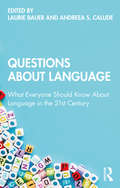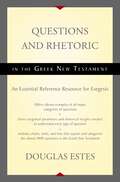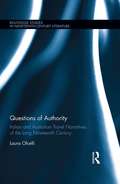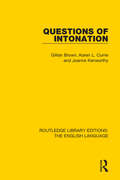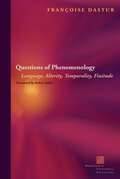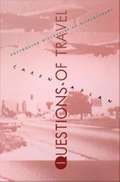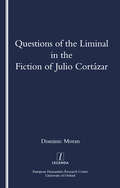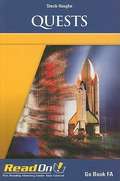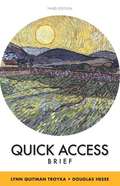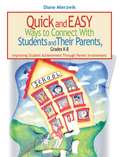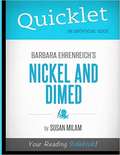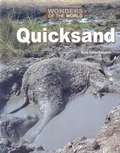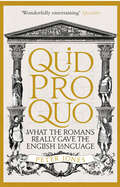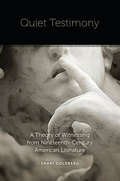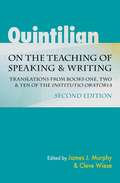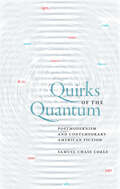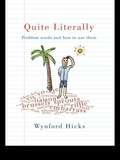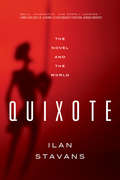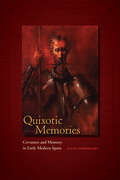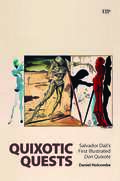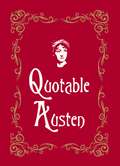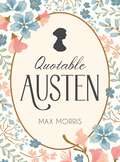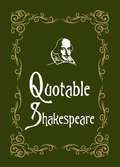- Table View
- List View
Questions About Language: What Everyone Should Know About Language in the 21st Century
by Laurie Bauer Andreea S. CaludeQuestions About Language sets out to answer, in a readable yet insightful format, a series of vital questions about language, some of which language specialists are regularly asked, and some of which are so surprising that only the specialists think about them. In this handy guide, sixteen language experts answer challenging questions about language, from What makes a language a language? to Do people swear because they don’t know enough words? Illustrating the complexity of human language, and the way in which we use it, the twelve chapters each end with a section on further reading for anyone interested in following up on the topic. Covering core questions about language, this is essential reading for both students new to language and linguistics and the interested general reader.
Questions and Rhetoric in the Greek New Testament: An Essential Reference Resource for Exegesis
by Douglas EstesWhile there are almost 1000 questions in the Greek New Testament, many commentators, pastors, and students skip over the questions for more ‘theological’ verses or worse they convert questions into statements to mine them for what they are saying theologically. However, this is not the way questions in the Greek New Testament work, and it overlooks the rhetorical importance of questions and how they were used in the ancient world. Questions and Rhetoric in the Greek New Testament is a helpful and thorough examination of questions in the Greek New Testament, seen from the standpoint of grammatical, semantic, and linguistic analysis, with special emphasis on their rhetorical effects. It includes charts, tools, and lists that explain and categorize the almost 1000 questions in the Greek New Testament. Thus, the user is able to go to the section in the book dealing with the type of question they are studying and find the exegetical parameters needed to understand that question. Questions and Rhetoric in the Greek New Testament offers vibrant examples of all the major categories of questions to aid the reader in grasping how questions work in the Greek New Testament. Special emphasis is given to the way questions persuade and influence readers of the Greek New Testament.
Questions of Authority: Italian and Australian Travel Narratives of the Long Nineteenth Century (Routledge Studies in Nineteenth Century Literature)
by Laura OlcelliQuestions of Authority investigates Italian–Australian literary travel exchanges throughout the long nineteenth century. The 1800s witnessed major transformations in Australian overseas travel: it gradually evolved from a replica of the Continental Grand Tour of the British, to a more idiosyncratic cosmopolitan experience, either touristic or professional. Moreover, it was during the second half of this century that both Italy and Australia underwent crucial political upheavals; these resulted in shifts from colonial and subjugated status, to self-government and ultimately independence. This volume connects these geographical, political and sociocultural contexts of Italy and Australia by considering their interlaced odeporic library, produced at a significant time in history. Additionally, this book analyses key texts compiled by Italians in Australia, and Australians in Italy: these chiefly consist of voyage accounts, but also include the records of explorers, missionaries, scientists and migrants coming from the Italian peninsula. These primary sources include unpublished travel diaries compiled by the first Victorian women visitors to the Bel Paese, which have been largely neglected by scholarship thus far. This examination pinpoints the enduring significance of Italy in travel-related terms, showing how this destination was adapted from the map of eighteenth-century British Grand Tourists, to that of nineteenth-century Australian holiday makers. Most critically, Questions of Authority argues Italian–Australian peripatetic connections entail issues of authority, that emerge in the ways in which Italian and Australian travel writers displayed their authorship, cultural capital and national identification in relation to the other country. Finally, it demonstrates how these are highly regulated by, and yet simultaneously challenge, British colonial hegemony.
Questions of Intonation (Routledge Library Editions: The English Language #5)
by Gillian Brown Karen L. Currie Joanne KenworthyFirst published in 1980, this book questions many of the assumptions that have accumulated around the subject of intonation as it occurs in spontaneous speech, as well as texts read aloud. The book suggests alternative ways of examining the subject and primarily uses data derived from Edinburgh speech, which is explicitly compared with descriptions of standard southern English. The book critically examines many conventional assumptions made about the formal features of intonation, particularly ‘tonic’ or primary stress’, and about the functions of intonation, specifically rising intonation. A model of intonation is presented which demonstrates that the limited resources of intonation are exploited by several different expressive systems. This approach is justified in detailed analysis of extensive stretches of speech, supported by instrumental analysis as well as by experiments which elicit judgements by both naïve and phonetically trained judges. This book will be of interest to students of linguistics, English Language, speech therapy, and English as a Foreign Language, as well as historians interested in the history of language.
Questions of Phenomenology: Language, Alterity, Temporality, Finitude (Perspectives in Continental Philosophy)
by Françoise DasturFrançoise Dastur is well respected in France and Europe for her mastery of phenomenology as a movement and her clear and cogent explications of phenomenology in movement. These qualities are on display in this remarkable volume. Dastur guides the reader through a series of phenomenological questions—language and logic, self and other, temporality and history, finitude and mortality—that also call phenomenology itself into question, testing its limits and pushing it in new directions. Like Merleau-Ponty, Dastur sees phenomenology not as a doctrine, a catalogue of concepts and catchphrases authored by a single thinker, but as a movement in which several thinkers participate, each inflecting the movement in unique ways. In this regard, Dastur is both one of the clearest guides to phenomenology and one of its ablest practitioners.
Questions of Travel: Postmodern Discourses of Displacement
by Caren KaplanContemporary theory is replete with metaphors of travel--displacement, diaspora, borders, exile, migration, nomadism, homelessness, and tourism to name a few. In Questions of Travel, Caren Kaplan explores the various metaphoric uses of travel and displacement in literary and feminist theory, traces the political implications of this "traveling theory," and shows how various discourses of displacement link, rather than separate, modernism and postmodernism. Addressing a wide range of writers, including Paul Fussell, Edward Said, James Clifford, Gilles Deleuze, Jean Baudrillard, Gayatri Spivak, Edward Soja, Doreen Massey, Chandra Mohanty, and Adrienne Rich, Kaplan demonstrates that symbols and metaphors of travel are used in ways that obscure key differences of power between nationalities, classes, races, and genders. Neither rejecting nor dismissing the powerful testimony of individual experiences of modern exile or displacement, Kaplan asks how mystified metaphors of travel might be avoided. With a focus on theory's colonial discourses, she reveals how these metaphors continue to operate in the seemingly liberatory critical zones of poststructuralism and feminist theory. The book concludes with a critique of the politics of location as a form of essentialist identity politics and calls for new feminist geographies of place and displacement. An important and timely intervention into contemporary theoretical debates, Questions of Travel will be of interest to scholars in a wide variety of disciplines, including literary criticism, cultural studies, feminist theory, colonial and postcolonial studies, geography, anthropology, and sociology.
Questions of the Liminal in the Fiction of Julio Cortazar
by Domenic Moran"The great Argentinian writer Julio Cortazar (1914-84) was immersed in one of the most vibrant and revolutionary intellectual scenes of the last century, the Paris of the 1950s and 60s. Yet his often highly cerebral work has never received the close philosophical attention it deserves. Moran's book fills this critical lacuna. Rather than indiscriminately applying 'theory' to Cortazar, it aims to show that his work both engages with and often foreshadows many of the problems which were to become central to so-called poststructuralist philosophy and poetics. This study demonstrates that Cortazar remains enduringly, problematically modern."
Quests (Read On! Go Book FA)
by Harcourt Achieve20 short stories designed to increase reading comprehension.
Quick Access Brief
by Lynn Quitman Troyka Douglas HesseTroyka and Hesse give practical advice to students about the writing they will do in composition courses, in other classes, and in the world beyond. Offering instructors a full range of choices in handbooks.
Quick and Easy Ways to Connect with Students and Their Parents, Grades K-8: Improving Student Achievement Through Parent Involvement
by Diane MierzwikThe research is indisputable. The more involved parents are with their child’s education, the more successful that child will be in school. Therefore, finding ways as a teacher to reach out to students and their parents is crucial in improving academic performance.Quick and Easy Ways to Connect With Students and Their Parents, Grades K-8 provides strategies to enrich the classroom environment, motivate students, and improve communication with parents. Supplying numerous sample forms, documents, and letters that teachers can use or adapt for their own purposes, author Diane Mierzwik offers simple, classroom-tested methods for building relationships with students and their parents.Designed for both beginning and experienced teachers, this hands-on guidebook includes information on:• Facilitating constructive parent-teacher conferences• Preparing for Back-to-School nights• Reaching out to uninvolved parents• Talking to parents about troubled students• Motivating even the most difficult students• Using e-mail as a communication tool and other time-saving tipsThe activities, suggestions, and techniques in this book can help any teacher make a substantive impact on the lives of students.
Quicklet: Barbara Ehrenreich's Nickel and Dimed
by The Quicklet TeamBarbara Ehrenreich's Nickel and Dimed has sold more than 1.5 million copies since its publication in 2001. It is required reading in many high school and college classrooms. The book has been translated into several languages. It has recently become available as an ebook. Nickel and Dimed received The 2001 Los Angeles Times Book Prize for Best Current Interest book Joan Holden wrote a play based on the characters found in Nickel and Dimed. Richard Brick and Ira Deutchman are developing a movie based on Nickel and Dimed. Mr. Brick is best known as the co-producer of several Woody Allen movies. He also worked with the late Peter Jennings.
Quicksand
by Kris HirschmannDeath by quicksand is a popular subject in movies and TV shows. Real-life quicksand is not as deadly as the fictional variety -- but it does exist, and in the right circumstances it can kill. This book explains what quicksand is, how it forms, and what happens if a person or animal falls in. It also recounts some true quicksand disasters.
Quicksolve Whodunit Puzzles: Challenging Mini-mysteries
by Jim Sukach Lucy CorvinoHelp Dr.Quicksolve solve murders, burglaries, frauds, kidnappings, and other mysteries. By reading each puzzle carefully, paying attention to detail and what people say, you'll be able to catch the crooks just as quickly as the ace detective, and you'll have a lot of fun doing it.
Quid Pro Quo: What the Romans Really Gave the English Language (Classic Civilisations Ser. #3)
by Peter JonesPeter Jones takes the reader on a fascinating journey along the highways and byways of Roman life and culture, telling the amazing stories behind the original Latin meanings and uses of hundreds of our everyday words. Taking in every aspect of the ancient world, including science, religion, military matters, politics and literature, Jones shows just how much the English language owes to the ancient Romans and the role Latin has played in the creation of our vast vocabulary.
Quiet Testimony: A Theory of Witnessing from Nineteenth-Century American Literature
by Shari GoldbergThe nineteenth century was a time of extraordinary attunement to the unspoken, the elusively present, and the subtly haunting. Quiet Testimony finds in such attunement a valuable rethinking of what it means to encounter the truth. It argues that four key writers—Emerson, Douglass, Melville, and Henry James—open up the domain of the witness by articulating quietude’s claim on the clamoring world.The premise of quiet testimony responds to urgent questions in critical theory and human rights. Emerson is brought into conversation with Levinas, and Douglass is considered alongside Agamben. Yet the book is steeped in the intellectual climate of the nineteenth century, in which speech and meaning might exceed the bounds of the recognized human subject. In this context, Melville’s characters could read the weather, and James’s could spend an evening with dead companions.By following the path by which ostensibly unremarkable entities come to voice, Quiet Testimony suggests new configurations for ethics, politics, and the literary.
Quintilian On The Teaching Of Speaking And Writing: Translations From Books One, Two And Ten Of The Institutio Oratoria (Landmarks In Rhetoric And Public Address)
by James J. Murphy Hugh C. WieseQuintilian on the Teaching of Speaking and Writing, edited by James J. Murphy and Cleve Wiese, offers scholars and students insights into the pedagogies of Marcus Fabius Quintilianus (ca. 35–ca. 95 CE), one of Rome’s most famous teachers of rhetoric. Providing translations of three key sections from Quintilian’s important and influential Institutio oratoria (Education of the Orator), this volume outlines the systematic educational processes that Quintilian inherited from the Greeks, foregrounding his rationale for a rhetorical education on the interrelationship between reading, speaking, listening, and writing, and emphasizing the blending of moral purpose and artistic skill. Translated here, Books One, Two, and Ten of the Institutio oratoria offer the essence of Quintilian’s holistic rhetorical educational plan that ranges from early interplay between written and spoken language to later honing of facilitas, the readiness to use language in any situation. Along with these translations, this new edition of Quintilian on the Teaching of Speaking and Writing contains an expanded scholarly introduction with an enhanced theoretical and historical section, an expanded discussion of teaching methods, and a new analytic guide directing the reader to a closer examination of the translations themselves. A contemporary approach to one of the most influential educational works in the history of Western culture, Quintilian on the Teaching of Speaking and Writing provides access not only to translations of key sections of Quintilian’s educational program but also a robust contemporary framework for the training of humane and effective citizens through the teaching of speaking and writing.
Quirks of the Quantum: Postmodernism and Contemporary American Fiction (Cultural Frames, Framing Culture)
by Samuel Chase CoaleEpisodic and disconnected, much of postmodern fiction mirrors the world as quantum theorists describe it, according to Samuel Chase Coale. In Quirks of the Quantum, Coale shows how the doubts, misgivings, and ambiguities reflected in the postmodern American novel have been influenced by the metaphors and models of quantum theory. Coale explains the basic facets of quantum theory in lay terms and then applies them to a selection of texts, including Don DeLillo's Underworld, Joan Didion's Democracy, and Thomas Pynchon's Against the Day. Using a new approach to literature and culture, this book aims to bridge the gap between science and the humanities by suggesting the many areas where they connect.
Quite Literally: Problem Words and How to use Them
by Wynford HicksThis is a guide to English usage for readers and writers, professional and amateur, established and aspiring, formal trainees and those trying to break in; students of English, both language and literature, and their teachers. In Quite Literally, Wynford Hicks answers questions like: What's an alibi, a bete noire, a celibate, a dilemma? Should underway be two words? Is the word 'meretricious' worth using at all? How do you spell realise - with an s or a z - and should bete be bête? Should you split infinitives, end sentences with prepositions, start them with conjunctions? What about four-letter words, euphemisms, foreign words, Americanizms, clichés, slang, jargon? And does the Queen speak the Queen's English? The advice given can be applied to both formal speech - what is carefully considered, broadcast, presented, scripted or prepared for delivery to a public audience - and will even enhance your everyday languange too! Practical and fun, whether to improve your writing for professional purposes or simply enjoy exploring the highways and byways of English usage, readers from all walks of life will find this book both invaluable and enjoyable.
Quixote: The Novel and the World
by Ilan StavansA groundbreaking cultural history of the most influential, most frequently translated, and most imitated novel in the world. The year 2015 marks the four hundredth anniversary of the publication of the complete Don Quixote of La Mancha--an ageless masterpiece that has proven unusually fertile and endlessly adaptable. Flaubert was inspired to turn Emma Bovary into "a knight in skirts." Freud studied Quixote's psyche. Mark Twain was fascinated by it, as were Kafka, Picasso, Nabokov, Borges, and Orson Welles. The novel has spawned ballets and operas, poems and plays, movies and video games, and even shapes the identities of entire nations. Spain uses it as a sort of constitution and travel guide; and the Americas were conquered, then sought their independence, with the knight as a role model. In Quixote, Ilan Stavans, one of today's preeminent cultural commentators, explores these many manifestations. Training his eye on the tumultuous struggle between logic and dreams, he reveals the ways in which a work of literature is a living thing that influences and is influenced by the world around it.
Quixotic Memories: Cervantes and Memory in Early Modern Spain (Toronto Iberic)
by Julia DominguezThe work of Miguel de Cervantes – one of the most influential writers in early modern Europe – is a reflection of the rich culture of memory in which it was created. More than a theme, memory is a system of understanding in Cervantes’s world, resulting from the major social, religious, and economic changes that epitomized Renaissance humanist culture and that informed the transition to modernity. Quixotic Memories offers insight into the plurality and complexity of memory and demonstrates how it plays an exceptionally critical role in Cervantes’s Don Quixote. It acknowledges Cervantes’s transition into modernity as he engaged with theories of memory that were developed in classical antiquity and adapted to the specific circumstances of his own time. Julia Domínguez explores the many spaces that memory created for itself in early modern Spain, particularly in the fields of philosophy, medicine, rhetoric, mnemotechnics, the visual arts, and pedagogy. Engaging with primary and archival sources, Quixotic Memories provides a new reading of Cervantes’s famous novel by tracing the socio-historical and cultural prominence of memory throughout the author’s lifetime.
Quixotic Quests: Salvador Dalí’s First Illustrated <em>Don Quixote</em> (Toronto Iberic)
by Daniel HolcombeSalvador Dalí illustrated Miguel de Cervantes’s Don Quixote for the first time while living in exile in the United States in the 1940s, collaborating with Random House to produce a special edition that was published in 1946. Quixotic Quests examines the material history of this 1946 edition by bridging art history, book history, literature, and narratology, while exploring Dalí’s role as its illustrator and the reception of both by mid-century popular culture, art historians, and literary scholars. Positing that much of Dalí’s life was quixotic in nature, the book investigates his quest to illustrate the novel with an unprecedented level of pictorial didacticism, despite challenges that the artist and Random House faced during and after the Second World War. It details his resolute passion to integrate surrealism with classicism, visual art with narrative, sexuality with sublimation, and privacy with public persona. Contrasting Dalí’s visual achievements with other artists and stylistic movements, Quixotic Quests sheds new light on the niche that Dalí created for himself as a surrealist illustrator of Don Quixote. Consulting his autobiographical narratives, the book analyses Dalí’s unique artistic contributions to the four-hundred-year print history of the novel, while emphasizing the artist’s heartfelt appreciation and respect for his book illustrations.
Quotable Austen (Quotable Ser.)
by Max MorrisThese entertaining collections gather together the wisest and wittiest quotations from some of Britain’s best-loved historical figures. Packed with humorous, perceptive and compelling quotes, they are sure to delight readers everywhere.
Quotable Austen: Memorable Quotes from Our Favourite Writer
by Max MorrisCelebrating Jane Austen's 250th birthday, this book is a charming collection of notable quotes from her most celebrated nineteenth-century novels A fine collection of the wisest and wittiest quotes from one of the most beloved and prominent British writers of all time, this book is sure to win you over with Jane Austen's ability for turning typical people and mundane events into charming and relatable stories. With over 140 quotes from her completed novels - Sense and Sensibility, Pride and Prejudice, Mansfield Park, Emma, Northanger Abbey and Persuasion - this book is the perfect opportunity for readers to immerse themselves in the refinement of the Regency era.Austen was well known for her astute social observation and keen insight into the lives of women in the early nineteenth century. This collection will urge you to:- Ardently admire and love- Feel the pangs of disappointed love - Find comfort in words of wisdom- Acquaint yourself with the refinements of polished society- Learn witty comebacks to leave your friends speechlessAfter all, it is a truth universally acknowledged that this would be the ultimate gift for Janeites and Austenites.
Quotable Shakespeare (Quotable Ser.)
by Max MorrisThis entertaining collection gathers together William Shakespeare's wisest and wittiest quotations. Quotable Shakespeare proves that brevity is the soul of wit and is sure to delight all lovers of the Bard's uniquely perceptive and influential works.
Quotable Shakespeare (Quotable Ser.)
by Max MorrisThis entertaining collection gathers together William Shakespeare's wisest and wittiest quotations. Quotable Shakespeare proves that brevity is the soul of wit and is sure to delight all lovers of the Bard's uniquely perceptive and influential works.
